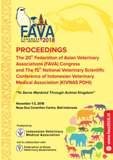VPH-4 The Influence of Medium pH on Lactobacillus acidophillus Viability in Soyghurt Tested In Vitro and In Vivo
Abstract
L. acidophillus bacteria have a high tolerance for acidic atmosphere. This bacterial resistance occurs because the ability to maintain cytoplasmic pH is more alkaline than extracellular pH so that all the different proteins and enzymes in it can still work optimally. L. acidophillus bacteria have cell membranes that are more resistant to cell leakage. Cellular membranes consisting of two layers of phospholipid (lipid bilayer) which on each surface of the layer are attached to proteins and lipid bilayer glycoproteins are semipermeable, which will limit the movement of compounds in and out between the cytoplasm and the external environment. The digestive tract has a different pH, starting from the oral cavity with a pH ranging from 6-7 (interval), stomach with pH 1.5-2 (acid), and intestine with a pH of 8-8.9 (base). Many bacteria can live and have habitat in the oral and intestinal cavities, but only certain bacteria are known to survive in the stomach. The nature of bacteria, in general, does not stand in an acidic atmosphere in the stomach, but there are also pathogenic bacteria (detrimental) that are resistant to the acidic atmosphere in the stomach so that it can cause disease in the digestive system. The stomach is an organ of the digestive system which functions to digest food and as the body's defense organ. The body's defense mechanism is carried out by the stomach against bacteria, namely by removing stomach acid. The presence and endurance of L. acidophillus bacteria in the stomach have not been reported. Therefore, in this study will be tested the effect of soyghurt containing L. acidophillus bacteria on the viability of L. acidophillus bacteria in the stomach and its effect on the gastric fluid profile of male Wistar rats.

